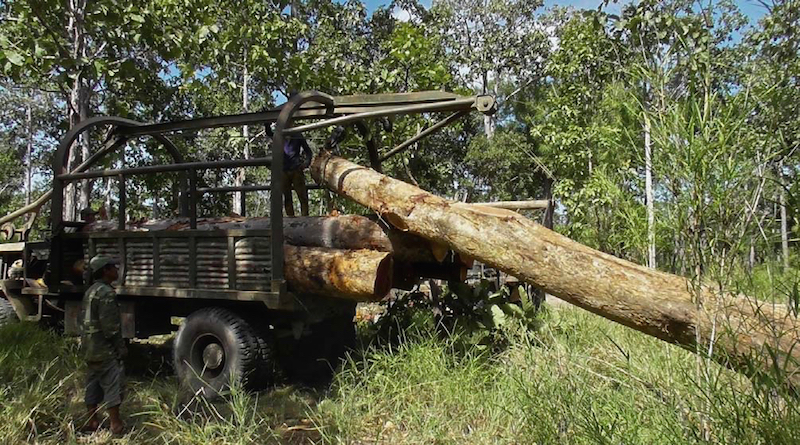Environment Minister Say Sam Al on Sunday said the government was investigating fresh evidence of industrial-scale illegal logging by Vietnamese companies in northeastern Cambodia and had already been probing related reports for the past year.
The revelation raises new questions about how the ministry could have let a massive timber smuggling operation it was at least partially aware of go ahead. It also belies the minister’s repeated denials over the past year that many millions of dollars worth of timber were still making it across the border—in breach of a January 2016 ban on all timber exports to Vietnam—despite mounting evidence, including Vietnamese customs data.

The latest revelations of rampant illegal logging and timber trafficking were detailed in a report released a week ago by the U.K.’s Environmental Investigation Agency (EIA). In the first few days after its release, Mr. Sam Al said he and his staff were parsing the report but declined to say more.
On Sunday, the minister said a full-on investigation was underway but still declined to elaborate.
“I can’t say more because it’s an ongoing investigation,” he said.
Mr. Sam Al said some of the report’s claims were already known to the ministry and had been under investigation for “about a year,” though he would not say which.
“Some of the claims are new,” he said. “Some of the claims [are] already part of our investigation.”
He declined to comment when asked how the ministry could have let a major illegal logging operation it says it was investigating for the past year still take place.
The EIA, which sent teams of undercover investigators to Cambodia and Vietnam, blames widespread corruption. It says the Vietnamese companies paid off officials in Ratanakkiri province with millions of dollars to log protected areas and probably smuggled out more than 300,000 cubic meters of timber between late last year and early this year.

EIA says villagers told its investigators that provincial governor Thong Savorn celebrated a deal with the Vietnamese companies last year with a public feast. Mr. Savorn denied the allegation last week.
Marcus Hardtke, a veteran investigator of Cambodia’s illicit timber trade, said on Sunday that if the Environment Ministry was in fact investigating related reports for the past year then it was probably being blocked from high up.
“We have to assume that someone in Phnom Penh approved this illegal deal,” he said. “That would explain why they were able to operate over the whole dry season, and why investigations and legal proceedings are stalled.”
Neither Mr. Savorn nor his provincial environment department director could be reached on Sunday about the investigation. Deputy provincial governor Nhem Sam Oeun said he was not aware of it.
In a related development, Vietnam and the E.U. signed off on a Voluntary Partnership Agreement on Thursday, one of many steps toward a trade scheme meant to ensure that Vietnam’s export of timber products to the bloc are legally sourced.
Before the agreement takes effect, Vietnam still has to develop new legislation and will need to pass what amounts to a test run of the program. But the EIA report raises fresh doubts that the scheme can work.
The European Commission office in charge of the trade scheme and the E.U. delegation in Hanoi have not replied to requests for comment about the EIA’s findings and what they might mean for a final deal.
(Additional reporting by Chhorn Phearun)



